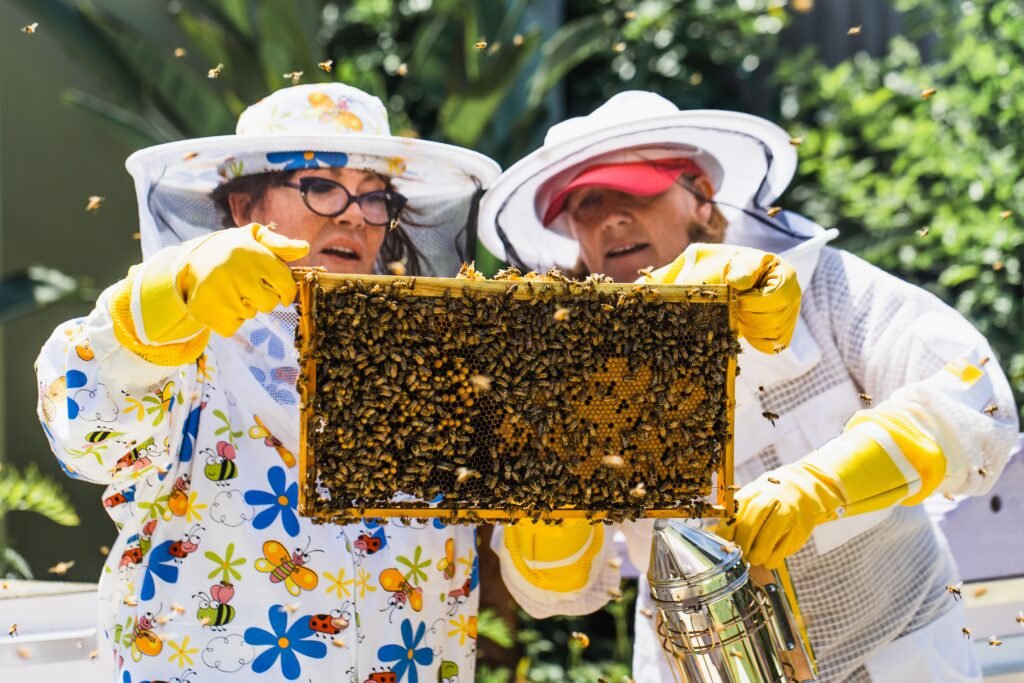
Are you curious about how to cure gastritis fast at home or how to naturally heal your stomach lining with honey – honey for gastritis?
These are common questions that many individuals seek answers to when grappling with gastritis pain and discomfort.
Among the myriad remedies available, honey emerges as a surprisingly effective solution. Research suggests that honey, renowned for its antibacterial properties, can play a significant role in alleviating gastritis symptoms.
It doesn’t stop there—honey’s healing prowess extends to addressing a spectrum of stomach ailments, including infections, acid reflux, ulcers, and even diarrhea.
But here’s the sweet kicker: honey is more than just a delicious treat.
Did you know that honey has been used for centuries as a healing agent?
Ancient civilizations, including the Egyptians and Greeks, revered honey for its medicinal properties. Its antibacterial and anti-inflammatory qualities make it a versatile remedy for various ailments, including gastritis.
Furthermore, honey contains antioxidants that help promote healing and protect against cellular damage.
When combined with gastritis supplements and other natural remedies, honey becomes a potent ally in combating gastritis pain.
So, is honey good for gastritis?
Absolutely!
By incorporating this golden elixir into your routine, you can expedite relief and support your stomach’s recovery.
As you explore the world of gastritis remedies, remember the remarkable healing potential that honey offers. Beyond its delectable taste, honey stands as a testament to nature’s ability to nurture and heal.
How Does Honey Help With Gastritis?

Honey’s reputation as a natural remedy spans centuries, with cultures worldwide recognizing its medicinal benefits.
Its therapeutic potential extends beyond mere sweetness, encompassing antibacterial, anti-inflammatory, and antioxidant properties.
These attributes collectively contribute to its efficacy in addressing gastritis symptoms and promoting stomach health.
Here is how honey contributes in managing gastritis:
- Antibacterial properties
Honey contains natural antibacterial compounds that can help combat bacterial infections in the stomach, which may contribute to gastritis.
By targeting harmful bacteria, honey can support the body’s efforts to reduce inflammation and promote healing of the gastric mucosa.
- Anti-inflammatory effects
Gastritis involves inflammation of the stomach lining, leading to discomfort and pain.
Honey possesses anti-inflammatory properties that can help soothe inflammation and alleviate symptoms associated with gastritis.
By reducing inflammation, honey supports the healing process and promotes overall gastric health.
- Protective effects on the stomach lining
Studies suggest that honey may help strengthen the stomach lining and enhance its protective barrier function.
This can help prevent further damage to the stomach lining and promote the repair of existing damage caused by gastritis.
Additionally, honey’s soothing properties can provide relief from symptoms such as stomach pain and discomfort.
- Rich in antioxidants
Honey contains antioxidants that help protect the body’s cells from damage caused by harmful free radicals.
These antioxidants can support overall gastrointestinal health and contribute to the healing process in gastritis.
By neutralizing free radicals and reducing oxidative stress, honey promotes tissue repair and supports the body’s natural defenses against inflammation and damage.

Manuka Honey: The Shocking Gastritis Game-Changer Revealed by Science!
In a jaw-dropping laboratory study published in the “Journal of the Royal Society of Medicine” in 1994, researchers uncovered a startling truth: Manuka honey.
It’s renowned for its extraordinary antibacterial properties, and possesses a formidable ability to combat the notorious Helicobacter pylori (H. pylori) bacteria, the culprit behind gastritis and ulcers.
The study’s findings are nothing short of revolutionary. A 20 percent solution of Manuka honey proved to be a formidable adversary, inhibiting not one, not two, but seven strains of H. pylori bacteria.
Meanwhile, a 40 percent solution of a conventional honey, relying on hydrogen peroxide as its primary antibacterial agent, failed to demonstrate any inhibitory activity against H. pylori.
This revelation left researchers astounded, leading them to conclude that Manuka honey’s unique compound, methylglyoxal (MGO), was the key to its exceptional effectiveness against H. pylori.
This revelation turns the tables on conventional wisdom, shattering long-held beliefs about honey’s role in gastritis relief.
While standard honey’s reliance on hydrogen peroxide falls short in combating H. pylori, Manuka honey emerges as a formidable ally in the fight against gastritis.
Its MGO-related activity stands as a beacon of hope for millions suffering from gastritis, offering a natural, potent, and scientifically validated solution to alleviate their symptoms and promote healing.
How Much Honey Should I Have For Gastritis?
Determining the appropriate amount of honey to consume for gastritis can vary depending on individual tolerance and the severity of symptoms.
As a general guideline, start with a small amount, such as a teaspoon, and gradually increase if it is well tolerated.
It’s essential to listen to your body and monitor how it responds to honey consumption.
If you notice any adverse reactions or exacerbation of symptoms, it may be wise to reduce the amount or discontinue use altogether.
Additionally, consider incorporating honey into your diet in various forms, such as mixing it with warm water or herbal tea, drizzling it over oatmeal or toast, or using it as a natural sweetener in recipes.
This way, you can enjoy the benefits of honey for gastritis while diversifying your intake.
Here are some tips on how to integrate honey and supplements into your daily routine:
- Honey in Warm Beverages
Add a teaspoon of honey to warm water or herbal tea. Sip on this soothing beverage throughout the day to help alleviate gastritis symptoms and provide relief to the stomach lining.
- Honey as a Natural Sweetener
Use honey as a natural sweetener in recipes such as smoothies, yogurt, or oatmeal. This allows you to enjoy the benefits of honey while adding flavor to your meals without resorting to refined sugars or artificial sweeteners, which can exacerbate gastritis symptoms.
- Honey and Supplements Combination
Consider pairing honey with supplements known for their beneficial effects on gastritis.
For example, probiotics can help restore the balance of healthy bacteria in the gut, while supplements for gastritis can help soothe and protect the stomach lining. Mix these supplements with honey for a tasty and effective gastritis remedy.

- Honey-Coated Snacks
Incorporate honey into snacks such as sliced fruits, nuts, or whole-grain crackers. Drizzle honey over these snacks for a delicious and nutritious treat that can help ease gastritis symptoms and provide sustained energy throughout the day.
- Honey in Cooking
Use honey as a natural sweetener in cooking and baking. Incorporate it into marinades, salad dressings, or sauces to add flavor and depth to your meals while reaping the benefits of its healing properties.
- Supplement Timing
Take supplements alongside honey-infused meals or beverages to enhance their absorption and effectiveness. Consuming them together can maximize their synergistic effects on gastritis management.
What Kind Of Honey Is Best For Gastritis?
When selecting honey for gastritis relief, opt for varieties that offer maximum therapeutic benefits and minimal potential for aggravating symptoms.
Here are some considerations to keep in mind:
- Raw Honey
Raw honey is minimally processed and retains more of its natural nutrients and enzymes compared to processed varieties.
These beneficial compounds can contribute to its healing properties, making raw honey a preferred choice for gastritis management.
- Manuka Honey
Manuka honey, produced from the nectar of the Manuka bush native to New Zealand, is renowned for its potent antibacterial properties.
It contains high levels of methylglyoxal (MGO), a compound responsible for its therapeutic effects. Manuka honey’s antibacterial action can help combat Helicobacter pylori (H. pylori) infection, a common cause of gastritis.
- Organic Honey
Choosing organic honey ensures that it is free from pesticides, antibiotics, and other harmful chemicals that may exacerbate gastritis symptoms.
Organic honey undergoes rigorous production standards, making it a safe and wholesome option for gastritis relief.
- Local Honey
Locally sourced honey may contain pollen from plants in your region, which could potentially offer immune-boosting benefits and help alleviate allergies.
While more research is needed on its specific effects on gastritis, local honey is generally well-tolerated and can provide a delicious addition to your gastritis management plan.
- Unprocessed Honey
Look for honey that has not undergone excessive heat or filtration, as these processes can diminish its therapeutic properties.
Opting for unprocessed honey ensures that it retains its natural enzymes, antioxidants, and other bioactive compounds that contribute to its healing effects.
Ultimately, the best type of honey for gastritis varies depending on individual preferences and sensitivities.
Experiment with different varieties to find the one that works best for you. Remember to consume honey in moderation and as part of a balanced diet to reap its potential benefits for gastritis relief.
PS: If you have any concerns or underlying health conditions, consult with a healthcare professional before incorporating honey into your gastritis management plan.












